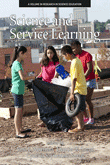
Science and Service Learning
Edited by:
Jane L. Newman, University of Alabama
Dennis W. Sunal, University of Alabama
Cynthia S Sunal, University of Alabama
A volume in the series: Research in Science Education. Editor(s): Dennis W. Sunal, University of Alabama. Cynthia S Sunal, University of Alabama. Emmett L. Wright, Kansas State University.
Published 2016
The goal of Volume VII of Research in Science Education is to examine the relationship between science inquiry and servicelearning. Its primary intent is to bridge the gaps between research and practice. The volume is meant to be useful to science and service‐learning researchers and practitioners such as teachers and administrators because it provides information about strategies to integrate service‐learning into the science curriculum and instruction.
The main themes relate to such topics as:
- Student science academic engagement and academic achievement.
- Teacher instructional strategies in science and service‐learning.
- Science curricula adaptation or development.
- Civic responsibility of students and community partners.
- Resiliency of students at‐risk.
- Effect of standards based service‐learning and science on student outcomes such as academic engagement, civic engagement, and resiliency to adversity.
Specific case studies and strategies focus on how to:
- Make learning more engaging. Encourage collaboration among students, teachers, and community partners.
- Improve academic competence.
- Create social/civic responsibility.
- Stimulate resiliency in students at‐risk.
- Improve student interest in STEM subjects and majors.
- Develop STEM career interests.
- Improve the quality of science and service‐learning instruction through addressing standards.
Students can learn in teacher‐centered classrooms, however, a learner‐centered class that focuses on science inquiry, and service‐learning is more authentic and engaging to learners. This type of learning may not be the only way to teach, however, many educators believe that it is the best way for students to learn (Jordan, 2005).
CONTENTS
Impact of Science and Service Learning on Middle School Students’ Resilience, Jane L. Newman and Junfei Lu. A Case Study of Speech Students and a Natural History Museum, Sally Blomstrom, Barbara Hayford and Lori Mumpower. Green Works in Service Learning and STEM Workforce Development for Urban Youth, Alexis Petri and Kate Corwin. Service Learning Experience Effects on High School Students’ Learning of Science Practices, Angela Chapman and Allan Feldman. Nurturing Multiple Curiosities: Priorities From a National Survey, Jennifer Forman. Connections and Contributions Through Research Service Learning, Terry M. Tomasek, Lacey D. Huffington, Catherine E. Matthews, and Heidi B. Carlone. Soils in the City, Christie Klimas, James Montgomery, Howard Rosing, Marji Hess, Xochyl Perez, and Christian DeKnock. Academic Service Learning: Community College Prenursing and Elementary Teacher Education Programs, Anita Cuttita Ferdenzi, Vazgen Shekoyan, and Sharon Ellerton. Learning and Emotion: The Power of Service Learning in STEM Fields, Maureen P. Hall and Aminda J. O’Hare. About the Contributors.
-
Paperback9781681237367
Web price: $45.04 (Reg. 52.99)
-
Hardcover9781681237374
Web price: $80.74 (Reg. 94.99)
- eBook9781681237381

- EDU029030 - EDUCATION: TEACHING METHODS & MATERIALS: Science & Technology
- EDU015000 - EDUCATION: Higher
- SCI075000 - SCIENCE: Philosophy & Social Aspects
-
 Physics Teaching and Learning
Challenging the Paradigm
Physics Teaching and Learning
Challenging the Paradigm
-
 Reform in Undergraduate Science Teaching for the 21st Century
Reform in Undergraduate Science Teaching for the 21st Century
-
 Research Based Undergraduate Science Teaching
Research Based Undergraduate Science Teaching
-
 Teaching Science with Hispanic ELLs in K-16 Classrooms
Teaching Science with Hispanic ELLs in K-16 Classrooms
-
 The Impact of State and National Standards on K-12 Science Teaching
The Impact of State and National Standards on K-12 Science Teaching
-
 The Impact of the Laboratory and Technology on Learning and Teaching Science K-16
The Impact of the Laboratory and Technology on Learning and Teaching Science K-16
-
 The Role of Public Policy in K-12 Science Education
The Role of Public Policy in K-12 Science Education

